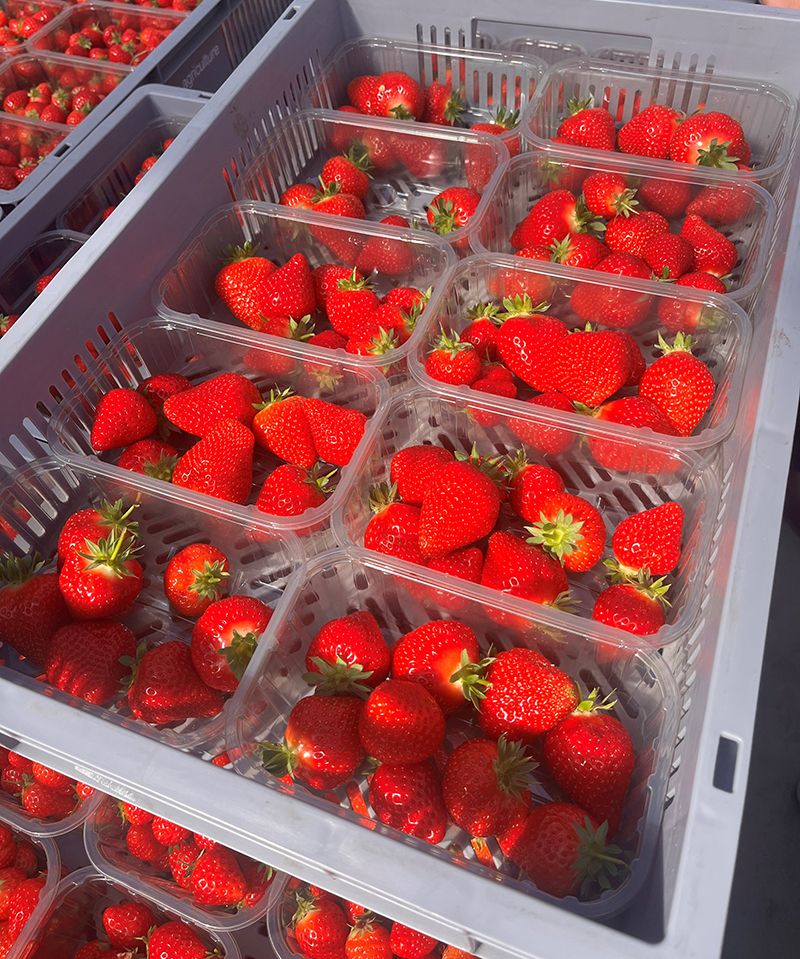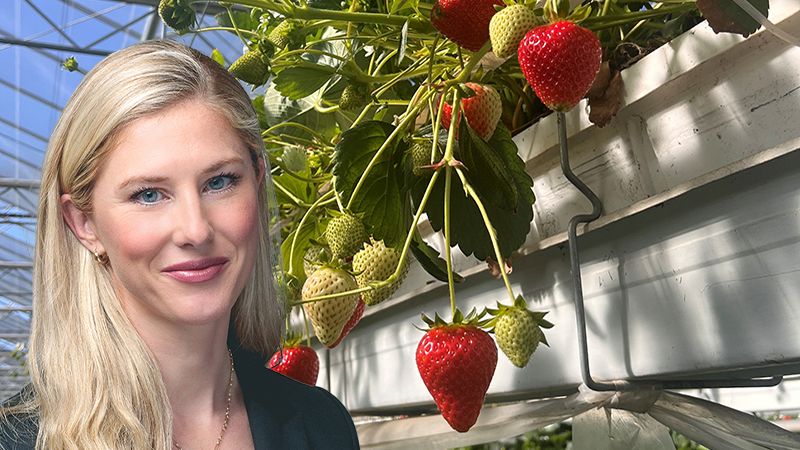Last week I went to a strawberry farm in Sussex. But this was no average pick-your-own. This was a £22m state of the art facility with patented growing frames, temperature-controlled glass houses, lights that wake up pollinator bumble bees by mimicking natural sunrise, a 36,000 cubic meter rain water butt with UV filtration system, cameras to monitor photosynthesis and biomass facility bigger than a block of flats.
I learned that being a farmer can look a lot like being an Olympic coach. It’s all data, data, data in a bid to hit that efficient frontier. Margins are tight and the control environments tighter.
I also learned that in this entire impressive facility there was only one British worker. Every single other skilled labourer – my interpretation of the work rather than the immigration office’s – was a foreign national, and the majority, were seasonal workers.
And here comes the reason why a head of research is waxing lyrical on strawberries in a column dedicated to ESG risks and opportunities. The seasonal worker scheme isn’t working as well as it should.
So last week, as part of a day organised by ethical investment firm CCLA for us equity and fund specialists, I spent the day on a crash course on what is essentially supply chain risk for food retailers; the potential exploitation of people.

Even impressive farms such as the one we visited, with commitments to net zero, fair working conditions and pay, and a 40% returning staff rate, find it difficult to ensure that staff sourcing has been completely fair and legal in the supply country of origin.
The seasonal worker scheme is a six month visa, restricted to horticulture jobs – fruit, vegetable and flower picking. Only registered operators can provide workers to the scheme, and they are issued a set number of visas each year. The scheme was set up following Brexit when the flow of European temporary workers was no longer viable.
For the first few years the demand was mostly met by Ukrainian workers, but following the Russian invasion, it has been necessary to source workers from far further afield, including Indonesia, Nepal, Kazakhstan and Kurdistan.
British fruit and vegetables are an essential part of our agricultural economy and food supply system, but unlike climate change, the human risks are not widely understood by consumers.
As well hearing from those who work on the farm, and specialist recruitment and operational firms who provide the farms with seasonal workers, we also spoke to NGOs. Representatives from the Land Workers Alliance, FairSquare and Anti-Slavery International explained that of the 45,000 seasonal worker visas issued every year – up from just 1,500 visas when the scheme was introduced in 2019 – 20% of workers do not have a good experience. Mismatched supply and demand is a big contributor to this stat. It is estimated that 40% of seasonal workers miss out on one month’s work of the six months the visa lasts for, and 20% miss out on two months work, a third of the whole scheme. The scheme rules were recently enhanced to try to combat these issues, and farms are supposed to supply 32 hours of work a week. However, we learned that some operators simply terminate workers contracts if they cannot fulfil this requirement, leaving the workers with no income at all.
Missing out on earning potential is never a good thing, but for those who have paid upwards of £1,000 to get to the UK and a further £250 for a visa, every missing pound of earnings hurts – and those are just the legitimate fees.
The UN’s International Labour Organisation (ILO) sets global standards for decent work. The ILO says labour recruiters must not charge migrant workers, directly or indirectly, any fees or related costs. The Institute for Human Rights and Business has a similar commitment in the Employer Pays Principle. The seasonal worker scheme potentially falls foul of those guidelines in that workers must pay travel and visa costs – even before illegitimate sub-agent fees or local officials demand bribes.
Under the scheme rules, none of scheme operators charge workers to come and workers should only pay for their visa and travel. But fraudulent companies exploit the fact that salaries on the scheme are far higher than workers can earn in their countries and set themselves up as a broker between workers and legitimate scheme operators. Advertising mostly on Facebook and Instagram, backed up with cloned websites, they charge hefty arrangements fees, requiring workers to hand over their birth certificate, certificate of education and even arranging loans using family property as collateral where workers can’t meet cash requirements. Some people will never receive a visa, others will – not knowing they have paid thousands of pounds and acquired crippling debt simply for a third party to fill out a form on their behalf.
A former seasonal work told us that loan sharks in his hometown in Indonesia had threatened his family when he was unable to meet interest rate payments. He also told us how despite the potential for a good wage in the UK, that did not materialise; colleagues would steal the barcodes that evidence his work as he was a top picker, his payslips would never match the hours he worked and he was charged £65 a week for squalid accommodation, plus extra for food and bills.
What can be done?
The NGOs suggest the scheme should be limited to fewer countries where there are better human rights records and supportive legal and regulatory systems. They also suggest that visas should be awarded to operators on merit – only those that eradicate supply chain risk or have a good rating for working conditions should be awarded visas for example. Freedom to move between operators is another suggestion – no work on farm one? Allow workers to move between all farms on the scheme to close the supply-demand gap.
One improvement has already been made; the scheme now has been guaranteed for the next five years. Previously it was renewed on an annual basis, in mid-December. Visas take at least two months to process, and the daffodil season begins in January. You can do the maths as to why that might create a supply and demand issue.
With timings more predictable, the next largest issue to solve is the scheme fees for the worker, and the exploitation the scheme invites because of those fees.
The National Farmers Union calculate that it would cost £90m a year to eradicate issue – to remove all costs to workers, and therefore, hopefully, the opportunity to game the system. The concern is that those costs will fall to farmers. While the farm we visited last week was large scale and had clearly benefited from considerable investment, it is an anomaly. Most British farmers are already under the cosh, to put it politely. There’s certainly not £90m spare swilling around. Pressure from price cutting supermarkets, and cheaper foreign fare have squeezed farmers in recent years, and that is before you take into consideration the impact of climate-change.
Many parts of the supply chain point upwards when asked who should bear the bill, to the supermarkets. Of the sale price of a strawberry, 26% goes to the farmer (of which just 2% is profit), around 14% goes to the picker (7% once visa and travel are deducted), and around 55% goes to the supermarket.
Representatives from Tesco and Sainsbury’s also spoke to us last week, and to be fair to the food retailers, they didn’t deny this responsibility. The difficulty is getting it to work operationally. Both supermarkets are members of the Seasonal Worker Scheme Taskforce, a group of industry trade bodies, retailers, growers, recruiters and non-profits. It is working on a feasibility study – working out who would have to be paid when, and who has accountability for what, as well as what regulatory support improvements would need.
Investors should urge their asset and wealth managers to support this. CCLA hosted the day, but there were also representatives from Schroders, TAML and LGT on the crash course with me. Investors need to understand what any listed food retailers they own are doing to manage these supply chain risks – we need a free-range-like accreditation for fruit pickers. Even the most dedicated of vegans can agree human rights are more important than chickens’.








